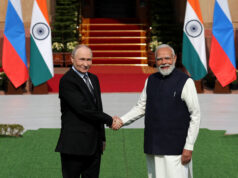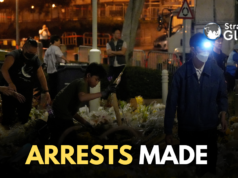Here we go again. Another terrorist attack in India. This time, Hindu tourists, targeted in Pahalgam, Kashmir.
You’d think this would be straightforward: innocent civilians ambushed, bullets flying, lives lost. But not if you’re the BBC.
“More than 20 killed after gunmen open fire on tourists in Indian-administered Kashmir”
Ah yes, gunmen. Mysterious figures. Possibly stressed-out accountants with AK-47s. Certainly not terrorists. That term is reserved for attacks that affect the West. Or white people.
Apparently, what India gets is a sanitised, soft-focus version:
“Gunmen.”
“Unidentified assailants.”
“Militants with grievances.”
Because heaven forbid we name them, describe their ideology, or mention that these attacks specifically targeted Hindus. That might offend the sensibilities of— Pakistani terrorists? Peace-loving Muslims? Or editorial boards in London and New York who think terrorism is just too crude a word for the global south?
This time, New Delhi said enough. Yes, the Indian government actually called on Jackie Martin, BBC India Head, and explained —slowly and in English—that describing a terrorist attack on tourists like it was a scene from a Bollywood film doesn’t quite cut it.
“Jackie, dear, we’re not asking for ‘Jai Shri Ram’ in the headlines. Just basic honesty would do.”
And it’s not just the BBC. This is a genre.
The New York Times? Loves a good “gun battle” between militants and security forces, even if it’s clearly an ambush on unarmed civilians.
The Washington Post? Always ready to explain the context of terrorism in South Asia, never quite ready to condemn it.
Western wire services—AP, Reuters, AFP—they all dip into the same thesaurus of evasiveness. At best, it’s a “suspected militant attack.”
God forbid we use the T-word. It might disrupt the balance of their carefully curated “both sides” narrative.
Yet when terror strikes Paris, or Boston, or Berlin— it’s “an attack on humanity.”
But when it hits Indians, especially Hindus?
It’s “complicated,” “a cycle of violence,” or “a security incident.” Because brown lives come with footnotes, you see. Western ones come with candlelight vigils and world leaders on Zoom.
And let’s not forget the geographical acrobatics—’Indian-administered Kashmir’, they insist, as if acknowledging India’s sovereignty over its own territory might cause allergic reactions in editorial rooms.
Strange how “Pakistani-occupied Kashmir” rarely gets such hyphenated scrutiny.
But here’s what these people who clearly still suffer from the White Man’s Burden need to know: terrorism isn’t a PR opportunity. It’s not a word you get to ration based on geography, religion, or skin tone. If you can call it terrorism in Manchester or Munich, Poland or Portugal, call it terrorism in Pahalgam.
Unless your problem isn’t with the crime — but with who the victims are.
In a career spanning three decades and counting, Ramananda (Ram to his friends) has been the foreign editor of The Telegraph, Outlook Magazine and the New Indian Express. He helped set up rediff.com’s editorial operations in San Jose and New York, helmed sify.com, and was the founder editor of India.com.
His work has featured in national and international publications like the Al Jazeera Centre for Studies, Global Times and Ashahi Shimbun. But his one constant over all these years, he says, has been the attempt to understand rising India’s place in the world.
He can rustle up a mean salad, his oil-less pepper chicken is to die for, and all it takes is some beer and rhythm and blues to rock his soul.
Talk to him about foreign and strategic affairs, media, South Asia, China, and of course India.




